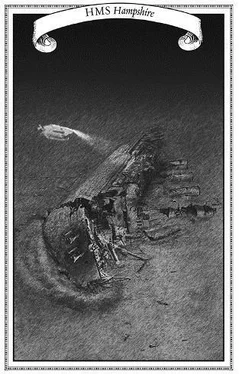Your obedient servant, “H.H. Kitchener”
“Whatever could this Manifest be?” Summer wondered.
“I don’t know, but Kitchener clearly held a copy of it and felt it was important.”
“Obviously the Church did, too.”
Summer heard the man behind her clear his throat, then turn and lean over their table.
“Pardon me for overhearing, but did you say Kitchener?” he asked with a disarming smile.
“Yes,” Summer replied. “My friend Julie is writing a biography of the field marshal.”
“My name is Baker,” Ridley Bannister lied, obtaining introductions in return. “Might I suggest that a better source of Lord Kitchener historical documents may be found at the Imperial War Museum?”
“Kind of you to say, Mr. Baker,” Julie replied, “but I’ve already exhaustively searched their materials.”
“Which brings you here?” he asked. “I wouldn’t expect a military hero’s influence to stretch very far into the Church of England.”
“Just tracing some correspondence he had with the Archbishop of Canterbury,” she replied.
“Then this would indeed be the place,” Bannister said, smiling broadly.
“What is the nature of your research?” Summer asked him.
“Just a bit of hobby research. I’m investigating a few old abbey sites that were destroyed during Henry VIII’s purge of the monasteries.” He held up a dusty book entitled Abbey Plans of Olde England , then turned again toward Julie.
“Have you uncovered any new secrets about Kitchener?”
“That honor belongs to Summer. She helped prove that the ship he was sunk on may have had a planted explosive aboard.”
“The Hampshire ?” he said. “I thought it was proven that she had struck a German mine.”
“The blast hole indicates that the explosion originated inside the ship,” Summer replied.
“Perhaps the old rumor of the IRA planting a bomb aboard may have been true,” he said.
“You know the story behind that?” Julie asked.
“Yes,” Bannister replied. “The Hampshire was sent to Belfast for a refit in early 1916. Some believe a bomb was inserted into the ship there and detonated months later.”
“You seem to know a lot about the Hampshire ,” Summer commented.
“I’m just an obsessive World War One history buff,” Bannister replied. “So, where is your research taking you from here?”
“We’ll be going to Kent for another pass through Kitchener’s personal papers housed at Broome Park,” Julie said.
“Have you seen his last diary?”
“Why, no,” Julie said, surprised at the question. “It has always been presumed to have been lost.”
Bannister looked down at his watch. “Oh my, look at the time. I’m afraid I must run. It was a delight to meet you ladies,” he said, rising from the table and offering a faint bow. “May your quest for historical knowledge meet with profound fulfillment.”
He quickly returned his book to the librarian, then waved good-bye as he left the reading room.
“Quite a handsome fellow,” Julie gushed with a grin.
“Yes,” Summer agreed. “He was certainly knowledgeable about Kitchener and the Hampshire .”
“That’s true. I wouldn’t think too many people would be aware that Kitchener’s last diary went missing.”
“Wouldn’t it have gone down with him on the ship?”
“Nobody knows. He traditionally captured his writings in small bound books that covered the period of a single year. His writings from 1916 were never found, so it’s always been presumed that he carried it with him on the Hampshire .”
“What do you make of Mr. Baker’s claim that the IRA may have bombed the Hampshire ?”
“It’s one of many outlandish assertions that arose after the sinking that I’ve found has no historical justification. It’s difficult to believe that the Hampshire would have been carrying a bomb aboard for over six months. The IRA, or Irish Volunteers as they were known at the time, certainly wouldn’t have known that far in advance that Kitchener would set foot on the ship. They didn’t actually become a very militant group until the Easter Rising in April of 1916, well after the Hampshire had left Belfast. More telling is the fact that they never actually claimed responsibility for the sinking.”
“Then I guess we keep digging,” Summer said, opening up a new folder of the Archbishop’s papers.
They worked for another hour before the stacks grew thin. Nearing the bottom of her last folder, Summer suddenly sat upright when she read a short letter from a Bishop in Portsmouth. She read it a second time before passing it over to Julie.
“Take a look at this,” she said.
“‘The parcel has been delivered and the messenger sent away,’” Julie said, reading the letter aloud. “‘The item of interest shall cease to be a concern within 72 hours.’ Signed, Bishop Lowery, Portsmouth Diocese.”
Julie set the letter down and gave Summer a blank look. “I’m afraid I don’t see the relevancy,” she said.
“Look at the date.”
Julie gazed at the top of the letter. “June 2, 1916. Three days before the Hampshire sank,” she said in a surprised voice.
“It would seem,” Summer said quietly, “that the plot has thickened.”
After exiting the library, Ridley Bannister made his way across the Lambeth Palace grounds to a small brick building adjacent to the main living quarters. Entering through an unmarked door, he stepped into a cramped office, where a handful of men in security uniforms stared at video surveillance monitors or worked at desk computers. Ignoring the quizzical look from a man seated near the door, Bannister stepped toward a private office in the rear and walked through its open door.
A falcon-eyed man with greasy hair was seated at a desk watching a live video feed on his computer. Bannister could see the figures of Julie and Summer seated at a table in the reading room. The man looked up, shooting Bannister a disappointed look.
“Bannister, there you are. You were supposed to check in with me before the ladies arrived. Now you’ve blown your cover.”
Bannister slid into a wooden chair facing the desk. “Sorry, old boy, they forgot my wake-up call at the Savoy this morning. I do want to thank you for the airline tickets, though. Glad you remembered first class this time.”
The Archbishop of Canterbury’s chief of security ground his teeth in contempt.
“You did purge the files before they were turned over to them?” he asked, motioning toward his computer screen.
“I’ve been through those files before, Judkins,” Bannister said, picking a piece of lint off his jacket. “There’s nothing incriminating in those files.”
Judkins’s face turned red. “You had orders to review and clean those files.”
“Orders? Orders, you say? Have I unknowingly been conscripted into the Archbishop’s private army?”
There had been an immediate dislike between the two men the instant they had met, and the feelings only festered over time. But Judkins was Bannister’s appointed contact, and there was little either man could do about it. The archaeologist pushed the line with Judkins as far as he dared without jeopardizing his contractual arrangements with the Church.
“You are an employee of the Archbishop and you will obey his requests accordingly,” the security chief responded, his eyes aglow.
“I am nothing of the sort,” Bannister retorted. “I am a simple mercenary for historical truth. While it may be true that the Archbishop has enlisted my services from time to time, I am under no obligation to ‘follow orders’ or even bow or curtsy in the esteemed Archbishop’s general direction.”
Читать дальше












